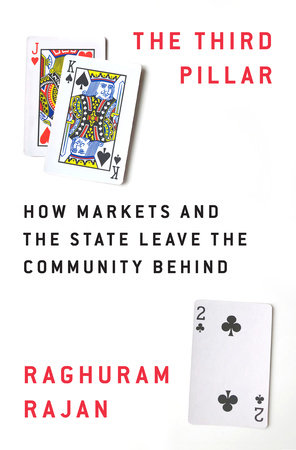I’m looking forward to reading the latest book from Raghuram Rajan called The Third Pillar. Rajan is a finance professor at the University of Chicago Booth School of Business. He was also the 23rd gover of the Reserve Bank of India from 2013 to 2016. He is also the author of Saving Capitalism from the Capitalists, and Fault Lines, which was awarded the Financial Times and McKinsey Business Book of the Year in 2010. His latest book looks at some of the failings of capitalism and government. The third pillar refers to the local community.
The book description from Penguin Random House: “From one of the most important economic thinkers of our time, a brilliant and far-seeing analysis of the current populist backlash against globalization.
“Raghuram Rajan, distinguished University of Chicago professor, former IMF chief economist, head of India’s central bank, and author of the 2010 FT-Goldman-Sachs Book of the Year Fault Lines, has an unparalleled vantage point onto the social and economic consequences of globalization and their ultimate effect on our politics. In The Third Pillar he offers up a magnificent big-picture framework for understanding how these three forces–the state, markets, and our communities–interact, why things begin to break down, and how we can find our way back to a more secure and stable plane.
“The “third pillar” of the title is the community we live in. Economists all too often understand their field as the relationship between markets and the state, and they leave squishy social issues for other people. That’s not just myopic, Rajan argues; it’s dangerous. All economics is actually socioeconomics – all markets are embedded in a web of human relations, values and norms. As he shows, throughout history, technological phase shifts have ripped the market out of those old webs and led to violent backlashes, and to what we now call populism. Eventually, a new equilibrium is reached, but it can be ugly and messy, especially if done wrong.
“Right now, we’re doing it wrong. As markets scale up, the state scales up with it, concentrating economic and political power in flourishing central hubs and leaving the periphery to decompose, figuratively and even literally. Instead, Rajan offers a way to rethink the relationship between the market and civil society and argues for a return to strengthening and empowering local communities as an antidote to growing despair and unrest. Rajan is not a doctrinaire conservative, so his ultimate argument that decision-making has to be devolved to the grass roots or our democracy will continue to wither, is sure to be provocative. But even setting aside its solutions, The Third Pillar is a masterpiece of explication, a book that will be a classic of its kind for its offering of a wise, authoritative and humane explanation of the forces that have wrought such a sea change in our lives.”






